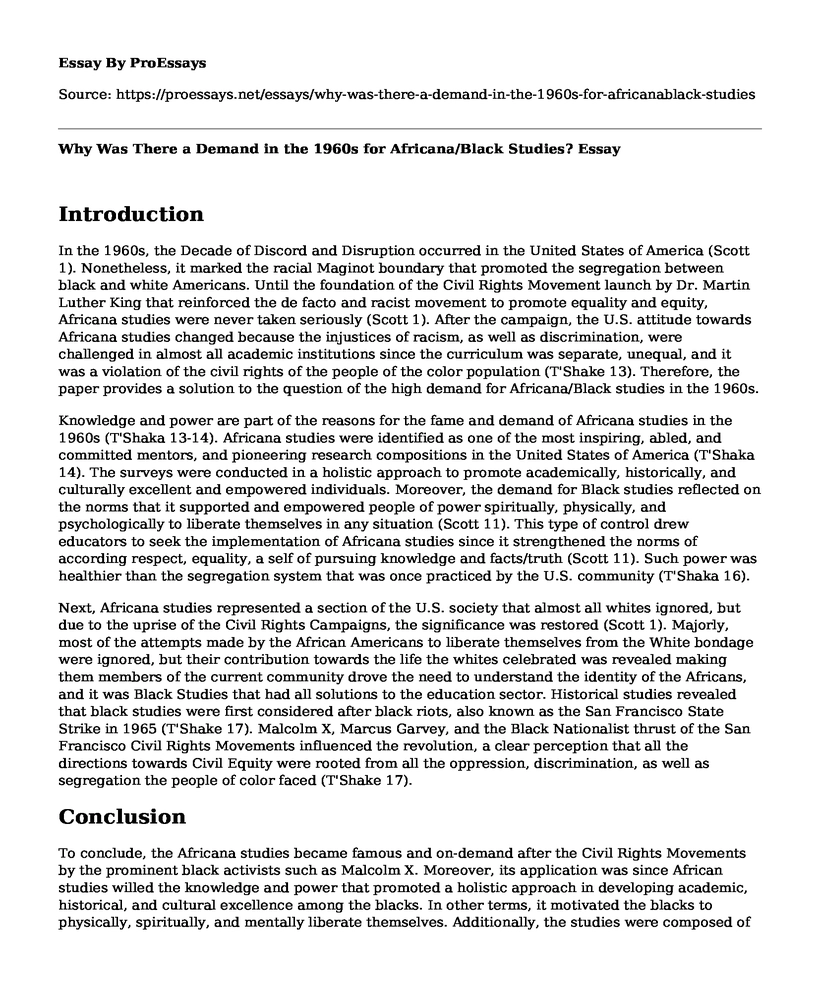Introduction
In the 1960s, the Decade of Discord and Disruption occurred in the United States of America (Scott 1). Nonetheless, it marked the racial Maginot boundary that promoted the segregation between black and white Americans. Until the foundation of the Civil Rights Movement launch by Dr. Martin Luther King that reinforced the de facto and racist movement to promote equality and equity, Africana studies were never taken seriously (Scott 1). After the campaign, the U.S. attitude towards Africana studies changed because the injustices of racism, as well as discrimination, were challenged in almost all academic institutions since the curriculum was separate, unequal, and it was a violation of the civil rights of the people of the color population (T'Shake 13). Therefore, the paper provides a solution to the question of the high demand for Africana/Black studies in the 1960s.
Knowledge and power are part of the reasons for the fame and demand of Africana studies in the 1960s (T'Shaka 13-14). Africana studies were identified as one of the most inspiring, abled, and committed mentors, and pioneering research compositions in the United States of America (T'Shaka 14). The surveys were conducted in a holistic approach to promote academically, historically, and culturally excellent and empowered individuals. Moreover, the demand for Black studies reflected on the norms that it supported and empowered people of power spiritually, physically, and psychologically to liberate themselves in any situation (Scott 11). This type of control drew educators to seek the implementation of Africana studies since it strengthened the norms of according respect, equality, a self of pursuing knowledge and facts/truth (Scott 11). Such power was healthier than the segregation system that was once practiced by the U.S. community (T'Shaka 16).
Next, Africana studies represented a section of the U.S. society that almost all whites ignored, but due to the uprise of the Civil Rights Campaigns, the significance was restored (Scott 1). Majorly, most of the attempts made by the African Americans to liberate themselves from the White bondage were ignored, but their contribution towards the life the whites celebrated was revealed making them members of the current community drove the need to understand the identity of the Africans, and it was Black Studies that had all solutions to the education sector. Historical studies revealed that black studies were first considered after black riots, also known as the San Francisco State Strike in 1965 (T'Shake 17). Malcolm X, Marcus Garvey, and the Black Nationalist thrust of the San Francisco Civil Rights Movements influenced the revolution, a clear perception that all the directions towards Civil Equity were rooted from all the oppression, discrimination, as well as segregation the people of color faced (T'Shake 17).
Conclusion
To conclude, the Africana studies became famous and on-demand after the Civil Rights Movements by the prominent black activists such as Malcolm X. Moreover, its application was since African studies willed the knowledge and power that promoted a holistic approach in developing academic, historical, and cultural excellence among the blacks. In other terms, it motivated the blacks to physically, spiritually, and mentally liberate themselves. Additionally, the studies were composed of collective histories, specifically the roles of the blacks in various historical events; thus, establishing a stable identity. In other terms, it marked the success of all black contributions in the U.S. battles and growth.
Work Cited
Scott, J. Why Africana Studies? 2013-14. https://www.csun.edu/social-behavioral-sciences/africana-studies/why-africana-studies accessed on 24 September 2019.
T'Shake, O. "Africana Studies Department History: San Francisco State University." The Journal of Pan African Studies (2012): 13-33.
Cite this page
Why Was There a Demand in the 1960s for Africana/Black Studies?. (2022, Mar 16). Retrieved from https://proessays.net/essays/why-was-there-a-demand-in-the-1960s-for-africanablack-studies
If you are the original author of this essay and no longer wish to have it published on the ProEssays website, please click below to request its removal:
- Older Workers Benefit Protection Act Essay
- Increase the Minimum Wage to Reduce Income Inequality in the United States - Essay Sample
- Research Paper on Globalization in the Steel Industry
- Beauty Services Related to Micro-Economics Essay Example
- Globalization in Financial Market: A Review of Research and Theories - Essay Sample
- Essay on SBU Fundamentals: Macroeconomic Dimensions for Business Strategy
- Essay Example on Retention: High Challenge for Companies in This Era







